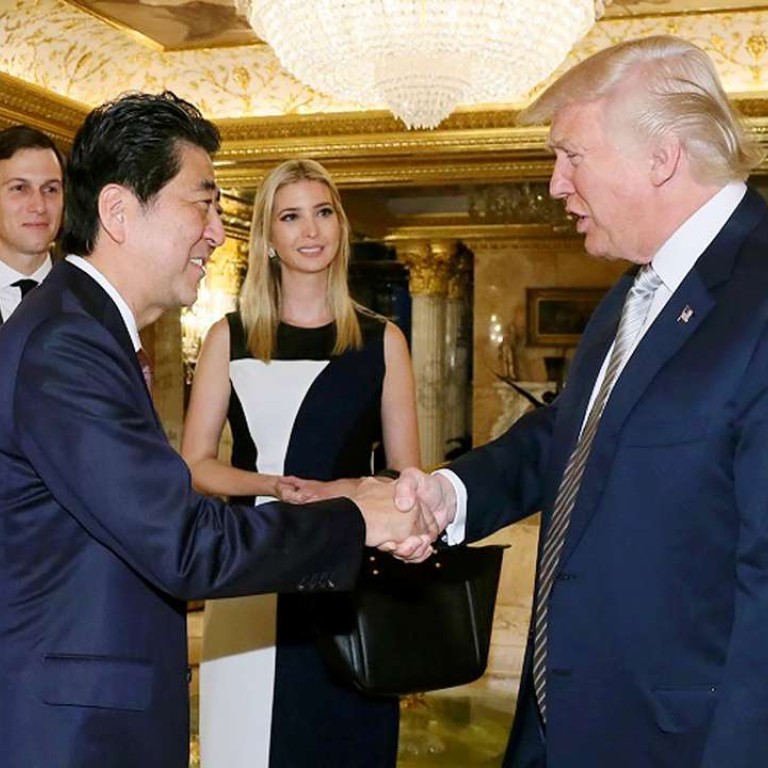
Japan may seize chance to slash yen as Trump homes in on yuan
Gambling on new US administration’s need for strong Japan ties, Abe could crank up yen output even if this in turn weakens yuan
If United States president-elect Donald Trump’s appointment of Peter Navarro to head a new Council of Trade is the prelude to strained relations between Beijing and Washington, the United States will not wish to alienate Japan at the same time.
Japanese economic policies that might ordinarily raise US eyebrows could instead pass unchallenged. The yen could fall further in value.
If Japan’s policies do prompt a renewed dive in the value of the yen, Beijing might decide that justifies a further fall in the yuan. In turn, while such an outcome would irk the Trump administration, it could, of course, be used as a pretext to justify imposing tariffs on imports from China.
At the very least, with Navarro’s literary output including books such as Death by China, his appointment surely prefigures a more muscular approach to Sino-US trade relations under a Trump presidency.
Already the current Obama administration and indeed the Japanese government have opted to decline official market economy status to China despite the fact that, in Beijing’s view, that categorisation should have been conferred on December 11, the 15th anniversary of China’s original accession to the World Trade Organisation.

Trump himself said “China is not a market economy” on December 8, just a few weeks after he met Japan’s Prime Minister Shinzo Abe on November 17, tellingly the president-elect’s first post-election meeting with an international leader.
“We want to continue to strengthen our ties with the US,” Abe said on December 21 in comments primarily referring to the Japan-US military alliance but which arguably have a wider resonance.
When it comes to currencies, Beijing could argue Trump had adopted a double standard. Noisily critical of a weakening yuan, and disregarding the fact China has spent more than US$800 billion of foreign reserves to try and slow that fall, the president-elect has had little to say about Japanese policies that have lent themselves to a sliding yen.
Perhaps Trump has reasoned that he will need a strong and supportive Japan if his attempts to recalibrate the Sino-US economic relationship strain ties between Beijing and Washington. That might give Tokyo some leeway on the yen.
Indeed, Bank of Japan Governor Haruhiko Kuroda will not even acknowledge the yen is overly weak. “For now, I don’t see current yen falls as excessive or posing any problem,” he said on December 20.
In truth, with the Federal Reserve having raised interest rates earlier this month and the US bond market yields having risen in expectation of fiscal stimulus by the Trump administration, the BoJ’s monetary policy settings are remarkably expansive as compared with the US, arguably making the yen even less attractive.

The BoJ still seems determined not to let Japanese Government Bond yields rise. “It’s absolutely not the case that Japanese Government Bond yields are allowed to rise in tandem with overseas long-term interest rates,” Kuroda emphasised.
Societe Generale’s Albert Edwards believes if US 10 year yields continue to drift up, then in order for the BoJ to achieve its goals, “the printing presses will go into overdrive and the yen will plunge, both against the dollar and against the euro”.
Tokyo already seems to be assuming the yen stays weak or weakens further.
It’s absolutely not the case that Japanese Government Bond yields are allowed to rise in tandem with overseas long-term interest rates
Announcing a record US$830 billion spending budget on December 22 for fiscal 2017, Japan’s government assumed a material increase in income predicated on a weak yen feeding into better returns on Japan’s investment of its foreign reserves as well as into higher corporate profits and thus tax receipts.
As Japan’s new fiscal year does not begin until April 1, the Abe government seemingly does not expect any push back from the new US president about the weakness of the yen.
Of course, as SocGen’s Edwards points out, “last time around, yen weakness dragged down the whole Asian currency complex and ultimately forced [China] to devalue in August [2015]. We could revisit that paradigm again very soon indeed.”
But that in turn might just give a Trump administration, seemingly fixated by the yuan’s value, an excuse to impose large tariffs on goods imported from China into the US, even if in that scenario yuan weakness would have been a logical consequence of a prior slide in the yen.
Trump needs Tokyo on-side in case broader ties between Washington and Beijing become strained as the new occupant of the White House seeks a recalibration of the China-US trade relationship.
So, if Japan wants a weak yen in coming months it may find Washington does not oppose the idea.

